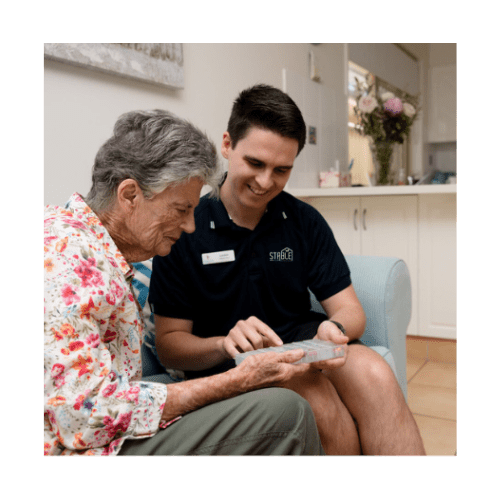Comprehensive Home Care Providers Australia: Incorporating NDIS Support Coordinators and Caregivers
Comprehensive Home Care Providers Australia: Incorporating NDIS Support Coordinators and Caregivers
Blog Article
How In Home Care Givers Address the Distinct Difficulties and Psychological Demands of Households Seeking Support for Their Family Members
At home caretakers play a crucial role in browsing the complexities encountered by households seeking support for their enjoyed ones. By comprehending one-of-a-kind household dynamics and giving tailored psychological support, these experts not only address prompt care requirements yet also promote an environment of trust fund and open communication (home care providers).
Comprehending Family Members Characteristics
Recognizing household characteristics is crucial for offering effective at home treatment, as each family members operates within a distinct collection of partnerships and communications. These dynamics include different components, consisting of interaction styles, duties, and power frameworks that influence exactly how care is supplied and received. The caregiver needs to identify these factors to make sure that treatment plans line up with the household's expectations and worths.
Various families might exhibit unique patterns of interaction, such as hierarchical structures or collective strategies. For example, in some family members, a primary decision-maker may hold considerable influence, while in others, decisions might be more democratic. Comprehending these patterns helps caregivers tailor their methods to fit the family's specific demands.
Additionally, cultural backgrounds play a vital role fit family dynamics. Caregivers need to be culturally qualified, acknowledging and respecting diverse practices and ideas that might affect treatment choices.
Eventually, an extensive understanding of family characteristics assists in enhanced interaction, promotes trust, and boosts the caregiver's ability to support the family effectively. By identifying the elaborate web of partnerships and duties, caregivers can create an encouraging setting that promotes well-being for both the private getting treatment and the family in its entirety.
Offering Emotional Assistance
Offering psychological support is a vital part of in-home treatment that significantly enhances the health of both the private obtaining care and their relative. In the context of caregiving, psychological assistance entails active listening, compassion, and validation of sensations. Caretakers are educated to recognize the emotional battles that families encounter, such as seclusion, guilt, and anxiety, and to offer a thoughtful presence that relieves these burdens.
By fostering open communication, caretakers create a safe area for household participants to reveal their issues and fears. This discussion not just urges psychological launch yet likewise enhances count on between the family and the caretaker. In addition, caretakers can use practical techniques to help families take care of stress and anxiety and advertise resilience.

Inevitably, the emotional support provided by at home caretakers enhances the quality of life for both clients and their families, advertising a much more caring and understanding caregiving environment. This all natural technique makes certain that emotional needs are resolved together with physical wellness factors to consider.
Handling Daily Care Tasks
Handling everyday treatment tasks is an important aspect of in-home care that ensures individuals obtain the support they need to preserve their wellness and independence. Caregivers play an important duty in assisting with tasks of everyday living (ADLs), which include showering, clothing, brushing, and dish prep work. By taking on these obligations, caretakers assist ease the physical and psychological problems that families might deal with while taking care of their liked ones.
In enhancement to individual care, caregivers are likewise charged with drug monitoring, making sure that clients follow recommended routines and does. This oversight is crucial for keeping wellness and preventing unfavorable impacts from missed or incorrect medicines. Caretakers usually aid with flexibility, giving assistance for customers relocating around their homes, therefore lowering the danger of falls and enhancing general security.

Fostering Open Interaction
Efficient management of daily treatment tasks often pivots on the high quality of interaction in between caretakers, clients, and their family members. Open interaction fosters a setting where worries, preferences, and responses can be freely traded, making sure that care is customized to satisfy individual requirements. Caregivers must prioritize normal check-ins with both clients and their families, assisting in discussions that attend to any concerns or modifications in care demands.
Making use of different interaction methods-- such as in person meetings, phone calls, and created updates-- can enhance understanding and supply families with satisfaction. It's crucial for caretakers to actively listen, showing compassion and respect for the psychological landscape of the family members. Motivating questions from member of the family can likewise help make clear treatment plans and strengthen the caregiver's commitment to openness.
In addition, keeping open lines of communication makes it possible for caregivers to acknowledge and react promptly to any kind of changes in a customer's health status or emotional wellness. This positive approach not only strengthens the caregiver-client dynamic however likewise encourages households to get involved proactively in the care procedure. Ultimately, fostering open communication is crucial for boosting the top quality of at home care and advertising an encouraging atmosphere for all included.
Building Count On and Relationships
Count on is the cornerstone of successful in-home care, as it establishes a foundation for meaningful see this website connections between caregivers, customers, and their family members. Structure this depend on needs consistent, transparent interaction and a genuine commitment to the well-being of those involved. Caregivers should demonstrate dependability with punctuality, adherence to care plans, and responsiveness to the needs and preferences of customers.
To cultivate trust fund, caretakers need to take part in active listening, making certain that family members really feel listened to and comprehended. This includes not only dealing with immediate concerns but additionally preparing for future requirements, thereby encouraging households and check that enhancing their feeling of control. Creating connection via shared experiences and considerate interactions can even more strengthen these connections.
Furthermore, caregivers must be trained to recognize and address the emotional complexities faced by families. By revealing empathy and compassion, they can relieve unpredictabilities and concerns, reinforcing depend on. Regular updates and check-ins with household participants can additionally enhance openness, allowing them to really feel engaged and notified concerning their enjoyed one's care.
Inevitably, building depend on and nurturing partnerships in in-home care is a joint process that substantially influences the quality of treatment given, fostering a helpful setting that benefits everybody entailed.
Conclusion
By comprehending household dynamics, providing emotional assistance, and fostering open communication, caretakers enhance the overall caregiving experience - in home caregivers. Their capacity to take care of daily care tasks while building trust fund and solid relationships cultivates an encouraging setting for clients and their families.
Recognizing household dynamics is important for providing reliable at home care, as each family members runs within an unique visit this web-site collection of partnerships and interactions.Giving psychological assistance is an essential part of at home care that significantly boosts the wellness of both the private obtaining treatment and their family participants. By taking on these obligations, caretakers help minimize the psychological and physical problems that family members might deal with while caring for their enjoyed ones.
Efficient management of everyday care tasks typically pivots on the high quality of interaction between caretakers, customers, and their family members - ndis plan manager.Depend on is the cornerstone of successful at home treatment, as it establishes a structure for meaningful partnerships between caregivers, customers, and their family members
Report this page